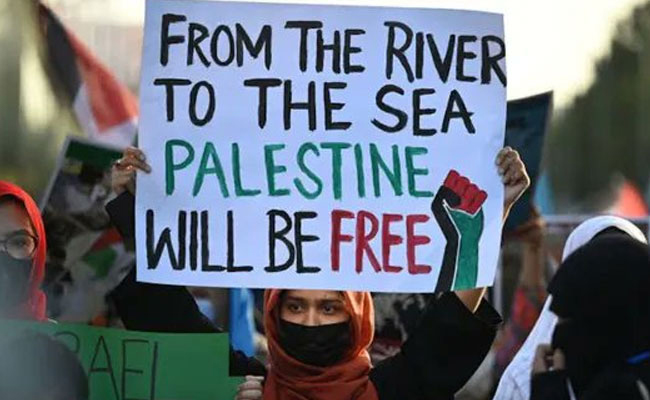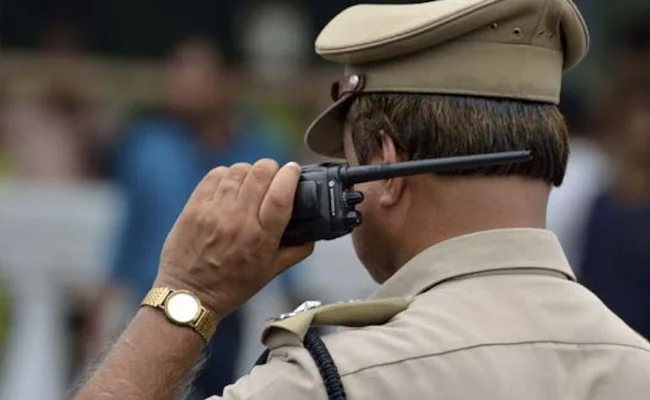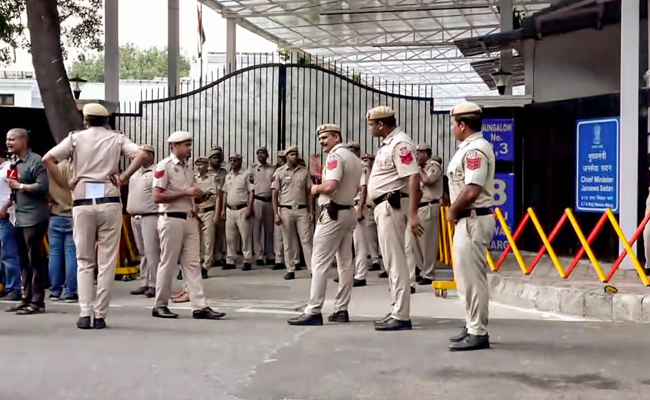The Hague (Netherlands) (AP): The top UN court said on Friday that Israel's presence in the Palestinian occupied territories is “unlawful” and called on it to end and for settlement construction to stop immediately, issuing an unprecedented, sweeping condemnation of Israel's rule over the lands it captured 57 years ago.
Israeli Prime Minster Benjamin Netanyahu quickly denounced the nonbinding opinion issued by the 15-judge panel of the International Court of Justice, saying the territories are part of the Jewish people's historic “homeland”. But the resounding breadth of the decision could impact international opinion and fuel moves for unilateral recognition of a Palestinian state.
The judges pointed to a wide list of policies, including the building and expansion of Israeli settlements in the West Bank and east Jerusalem, use of the area's natural resources, the annexation and imposition of permanent control over lands and discriminatory policies against Palestinians, all of which it said violated international law.
The court said Israel had no right to sovereignty in the territories, was violating international laws against acquiring territory by force and was impeding Palestinians' right to self-determination. It said other nations were obliged not to “render aid or assistance in maintaining” Israel's presence in the territories. It said Israel must end settlement construction immediately and that existing settlements must be removed, according to a summary of the more than 80-page opinion read out by court President Nawaf Salam.
Israel's “abuse of its status as the occupying power” renders its “presence in the occupied Palestinian territory unlawful,” the court said, saying its presence must be ended as “rapidly as possible”.
The court's opinion, sought by the UN General Assembly after a Palestinian request, decision came against the backdrop of Israel's devastating military assault on Gaza, which was triggered by the Hamas-led attacks in southern Israel on October 7. In a separate case, the International Court of Justice is considering a South African claim that Israel's campaign in Gaza amounts to genocide, a claim that Israel vehemently denies.
Israel, which normally considers the United Nations and international tribunals as unfair and biased, didn't send a legal team to the hearings. Instead, it submitted written comments, saying that the questions put to the court are prejudiced and fail to address Israeli security concerns. Israeli officials have said the court's intervention could undermine the peace process, which has been stagnant for more than a decade.
“The Jewish people are not conquerors in their own land — not in our eternal capital Jerusalem and not in the land of our ancestors in Judea and Samaria,” Netanyahu said in a statement issued by his office, using the biblical terms for the West Bank. “No false decision in The Hague will distort this historical truth and likewise the legality of Israeli settlement in all the territories of our homeland cannot be contested.”
Speaking outside the court, Riad Malki, an adviser to Palestinian President Mahmoud Abbas, called the opinion “a watershed moment for Palestine, for justice and for international law”.
He said other nations must now “uphold the clear obligations" outlined by the court. "No actions of any kind ... to support Israel's illegal occupation”.
Israel captured the West Bank, east Jerusalem and Gaza Strip in the 1967 Mideast war. The Palestinians seek all three areas for an independent state.
Israel considers the West Bank to be disputed territory, whose future should be decided in negotiations, while it has moved populations there in settlements to solidify its hold. It has annexed east Jerusalem in a move that isn't internationally recognised, while it withdrew from Gaza in 2005 but maintained a blockade of the territory after Hamas took power in 2007. The international community generally considers all three areas to be occupied territory.
The court's decision strikes at the heart of the ambiguity of Israel's administration of the territories. Israel hasn't annexed the West Bank — though settler groups have pressed it to do so — but it calls it part of its homeland and has effectively treated it as an extension of the nation. Along with the settlements, it has appropriated large swaths of the territory as “state lands”.
At the same time, Netanyahu's government has repeatedly rejected the creation of any Palestinian state. Abbas' Palestinian Authority has been restricted to control over divided enclaves scattered around the West Bank.
The Palestinians presented arguments at hearings in February, along with 49 other nations and three international organisations. In the hearings, Malki accused Israel of apartheid and urged the United Nations' top court to declare that Israel's occupation of lands sought by the Palestinians is illegal and must end immediately and unconditionally for any hope for a two-state future to survive.
Erwin van Veen, a senior research fellow at the Clingendael think tank in The Hague, said before the decision that a ruling that Israel's policies breach international law would “isolate Israel further internationally, at least from a legal point of view.”
He said such a ruling would remove "any kind of legal, political, philosophical underpinning of the Israeli expansion project.” It could also increase the number of countries that recognise a Palestinian state, in particular in the Western world, following the recent example of Spain and Norway and Ireland, he said.
It's not the first time the ICJ has been asked to give its legal opinion on Israeli policies. Two decades ago, the court ruled that Israel's West Bank separation barrier was “contrary to international law.” Israel boycotted those proceedings, saying they were politically motivated.
Israel says the barrier is a security measure. Palestinians say the structure amounts to a massive land grab, because it frequently dips into the West Bank.
Israel has built well over 100 settlements, according to the anti-settlement monitoring group Peace Now. The West Bank settler population has grown by more than 15 per cent in the past five years to more than 500,000 Israelis, according to a pro-settler group.
Israel also has annexed east Jerusalem and considers the entire city to be its capital. An additional 200,000 Israelis live in settlements built in east Jerusalem that Israel considers to be neighborhoods of its capital. Palestinian residents of the city face systematic discrimination, making it difficult for them to build new homes or expand existing ones.
The international community considers all settlements to be illegal or obstacles to peace since they are built on lands sought by the Palestinians for their state.
Netanyahu's hard-line government is dominated by settlers and their political supporters. Netanyahu has given his finance minister, Bezalel Smotrich, a former settler leader, unprecedented authority over settlement policy. Smotrich has used this position to cement Israel's control over the West Bank by pushing forward plans to build more settlement homes and to legalise outposts.
Let the Truth be known. If you read VB and like VB, please be a VB Supporter and Help us deliver the Truth to one and all.
Mangaluru: A police constable attached to the Vitla Police Station has been arrested for allegedly forging documents and manipulating passport verification records to obtain a clearance certificate from the authorities.
Police said on Tuesday that a person identified as Shakti Das, who claimed to be residing within the jurisdiction of the Vitla Police Station, first applied for a passport in February 2025.
During police verification, it was found that the address mentioned in the application did not match official records, following which the application was not recommended.
In June 2025, Shakti Das reportedly submitted a second passport application. Police alleged that Pradeep, a staff member at the Vitla Police Station, processed the reapplication without informing the concerned beat constable, Sabu Mirji, who was responsible for verifying the applicant’s address.
Pradeep allegedly prepared a verification report in the name of the beat constable, forged his signature, secured approval from senior officers, and forwarded the report. He is also accused of destroying verification-related documents to conceal the irregularities.
As per the report, the matter came to light on December 19 during a scrutiny of records. Police said the acts amounted to criminal breach of trust, as a crucial identity document issued by the Central government was fraudulently obtained.
Police further said that Shakti Das claims to hail from West Bengal, and his address is currently being verified.
Based on the findings, Vitla Police have registered a case against Pradeep and passport holder Shakti Das under Sections 336, 337, 316(5), and 238 of the Bharatiya Nyaya Sanhita (BNS), 2023.
Pradeep has been arrested and produced before a court, which remanded him to judicial custody. Further investigation is underway, police said.





